Women's Empowerment Network Delegation
Members Share Stories and Photos
In this September, 2004
edition of ¡Abrazos! de Mulukukú
you will find:
[All photos below, except for the first, are by Jane
Yett and Coleen Douglas. They have been reduced in size, and may be
viewed full size by simply clicking on them.]

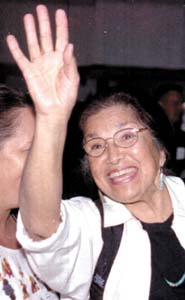 |
|
Photo courtesy of
Dr. Serena Yang
|
Dorothy serothy sends
her greetings from Managua, where she is hard at work writing grant proposals
for clinic and cooperative projects. She spoke with me, Friday, August
27, and sends her best wishes to all her friends and supporters, new and
long-term, who read the newsletter.
Most of the stories in this issue and
the next have been written by this year's visitors from the U.S. and Canada,
who hope to share the sense of vitality they witnessed in parts of Nicaragua,
especially Mulukukú. For those of us living far to the north, it
is hard to imagine the daily struggles for education, health care, nutrition,
and dignity the Nicaraguan people face. Your partnership in their well-being
maintains a tie for them to a more hopeful future.
Dorothy relates a story of a 17-year-old
resident of the 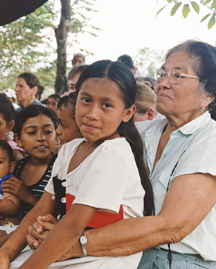 refuge
who just gave birth in the clinic. She had a little boy, who is adored
by all, and they are now part of the cooperative community. This young
woman’s story hasn’t always been a happy one. She had been forced into
prostitution at the age of 10, and came to the refuge to escape her difficult
circumstances.
refuge
who just gave birth in the clinic. She had a little boy, who is adored
by all, and they are now part of the cooperative community. This young
woman’s story hasn’t always been a happy one. She had been forced into
prostitution at the age of 10, and came to the refuge to escape her difficult
circumstances.
Because of 24-hour guards at the clinic
and great emotional and pre-natal support, her pregnancy has gone very
well. Everybody is excited about caring for this baby and his young mother
loves him very much. Even though her life started with terrible circumstances,
she is now supported by a caring community and is clear that she will never
be a prostitute again.
Dorothy tells us the clinic is doing
well and is very busy serving the Mulukukú community. Spirits are
up, and she plans to write a full report for the next newsletter!
Abrazos,
Julie Aguiar,
Longtime Mulukukú Supporter

Impressions
of a First-Time Visitor
By Greg Thrush, bilingual public health researcher
Before
arriving, I imagined Mulukukú was a rural village without
much infrastructure or population. The real Mulukukú surprised me.
The town is, in fact, a hub of activity; bigger and more developed than
I had thought. And the women's cooperative is definitely a gem within this
active area.
 |
| Victims of domestic violence receive 24-hour protection
and support. |
We met several of the original and current
active cooperative members who serve as staff. One of my strongest impressions
of the cooperative is how accomplished everyone is, both the women who
run it as well as those who are the upcoming leadership in Mulukukú.
The routine at the cooperative was impacted
by our short whirlwind visit in which Dorothy, Grethel and many others
offered us two amazing days of tours and presentations. Someof the ongoing
projects they shared with us include a youth program and new radio station,
an impressive legal defense office, and several agronomy projects, including
the production of rich organic soil using worms. They are also planning
an initiative to develop the communities' own human capacities in order
to identify, define and address their issues and desires.
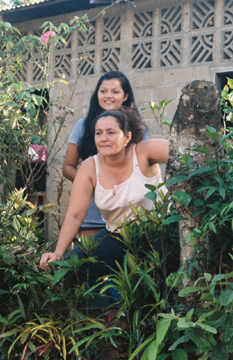 |
|
Daughter and mother cooperative members,
Jahaira and Carmen.
|
During a day when most of our delegation
went to an outlying community called Liberia, I stayed at the cooperative.
I enjoyed talking to everyone so much. It was the highlight of my trip,
and my Spanish got a workout! It was interesting to see how the cooperative
members work and socialize at the same time. It made me appreciate, in
a new way, how important the women's cooperative is to the community.
The young people we met seemed committed
to making a difference in their hometown as well as engaging themselves
in the world beyond Mululukú. I thought a lot about the continuity
of the cooperative's mission. I felt as if we were witnessing the fruits
of many years of effort as women and men in their 20's, who have been associated
with the
 |
| Cooperative members from two generations divide and expand
the social advocacy and health promotion work of the women’s center and
clinic. |
cooperative through their parents, begin to assume important roles within
the cooperative and the larger community. The young people possessed a
combination of worldly sophistication and local know-how that was attractive
and affirming. Some of them are continuing their formal education while
they work with the cooperative in capacities such as health education,
legal advocacy, agronomy and art. I left Mulukuku feeling excited about
the future of the cooperative and confident that it will be able to meet
new challenges creatively and capably.

The
Story of Nicaragua:
Historic
Overview and Analysis
By David Sweet, Ph.D., retired Professor of Latin
American and Latino History, UC Santa Cruz
Nicaragua is the
size of New York. A north central mountain range gives way to hills
in the south, to a narrow, fertile lowland along the Pacific Ocean and
to a broad, once-forested coastal plain on the Atlantic side.
Depopulated by conquest, the sparsely
settled country reached a population of one million inhabitants around
1950; then 1.5 million in 1963; 2.5 million in 1979; 4 million in 1990,
and over 5.5m today. Ninety percent are Spanish-speaking mestizos of the
mountains and Pacific coast, where Managua (1.2 million inhabitants) and
the principal cities are located. Recently, tens of thousands have migrated
eastward to open new farmland in places like Mulukuku. The Atlantic Coast
peoples, more British than Nicaraguan until recently, are Miskito, Sumo
and Rama Indians, Afro-Caribbean Creoles, and Garifuna. Three quarters
of Nicaraguans are Catholic; the rest, mostly evangelical Protestants.
Few countries have been worse governed
than Nicaragua. In the early days, President Zelaya's bid for economic
independence led to a U.S. military invasion and occupation from 1911 to
1933. Augusto Cesar Sandino, a successful guerrilla resistance leader,
was assassinated on orders from Anastacio Somoza of the U.S.-sponsored
National Guard. When Somoza then took power, the U.S. forces withdrew.
Somoza's kleptocracy then impoverished
the country for four decades, as he and a few retainers accumulated vast
wealth and properties, provided few social services, and met resistance
with extreme repression.
This oppressive regime was overthrown
by armed rebels and urban dissidents in 1979. The nationalist Christian
Marxist Sandinista government mobilized workers, peasants, women and youth
in an effort to transform the country by hard work and sacrifice. Young
people taught peasants to read. Books were distributed. Schools and clinics
appeared in communities that had never known them. Landed estates were
divided into agricultural cooperatives. Workers' rights were guaranteed.
Children were the first priority. Hope was widespread.
The Sandinista Revolution was unacceptable,
however, to the Reagan administration in Washington – which trained and
equipped the “Contra” invaders and imposed a trade-and-aid embargo. These
measures inflicted terrible damage, despite the efforts of European and
Latin American allies to keep the Sandinistas afloat. Many gains were reversed
during the Contra war, and the people suffered continuing poverty, inflation,
and disruption of services. The regime was never supported by the private
sector, and the self-employed; and in 1990, the war-weary Nicaraguans voted
the Sandinistas out of office.
Since then, a series of Nicaraguan administrations
have carried out a crash program of neoliberal "reforms": cuts in public
services, deregulation, and privatization combined with widespread corruption.
Promised U.S. assistance has been withheld, and the debt-driven "structural
adjustment" process has imposed a terrible social cost: half of government
jobs have disappeared, including those of 80,000 demobilized soldiers.
Unemployment exceeds 60 percent. Food production has fallen, as banks divert
loans from corn and bean production to export beef and coffee. Misery and
malnutrition are widespread, along with drug abuse, prostitution, crime
and domestic violence; and literacy and life expectancy are in decline.
Income distribution is among the worst in the world, and life for ordinary
Nicaraguans is in many ways worse even than it was under the Somozas.
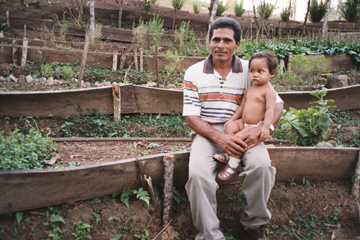 |
| Teodoro and his family supervise the work in the medicinal
garden. |
According to journalist Judy Butler, who
has spent her last twenty years working in Nicaragua, the country is in
a national state of post-traumatic stress, and more than half the population
is younger than 20 years old. Foreign Non-Government Organizations (NGOs)
and church missions flourish. The Nicaraguan government continues its tradition
of heavy-handed political wrangling, for example, by paying large pensions
to former presidents and vice presidents while most of the population exists
at a subsistence level and rarely see a doctor.
Within this stressful environment, efforts
such as the Maria Luisa Ortiz Clinic in Mulukuku, a grassroots organization
built on the hard work and sweat equity of local Nicaraguans, and open
to all in need, is a guiding light of hope for Nicaragua’s future.
“When
the Horns of the Moon are Pointed Up, It's a Good Time to Purge Parasites”
(local wisdom from Mulukuku)
By Jennifer Ryan, M.P.H., public health researcher
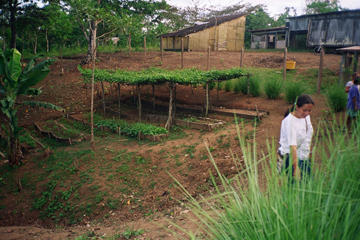 |
|
Doralisa, a university-trained agronomist,
experiments with new methods, including the organic soil
project.
|
Here in California,
the use of an integrated approach to health and wellness is considered
cutting edge. In Nicaragua, an integrated approach is necessary for survival.
Most people living in Nicaragua cannot afford to go to the doctor or simply
do not have access to clinics or medicine. In rural towns of Nicaragua,
medicinal herbs and traditional remedies are often relied upon as the only
available resources. It was interesting to note the health services provided
at Mulukuku incorporate traditional as well as modern techniques of healing.
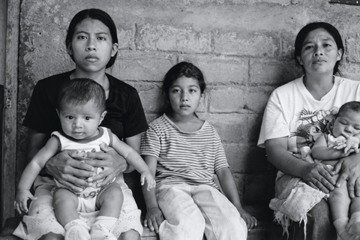 |
| Waiting to be seen at the Maria Luisa Ortiz Clinic, Mulukuku,
Nicaragua.. |
During our tour of the health facilities,
Dorothy discussed the many care options available to patients at the clinic.
The Mulukuku clinic is fortunate to have well-trained nurses and staff,
with a doctor available some weeks each month. In addition to allopathic
medicine, the clinic at Mulukuku also offers naturopathy, acupuncture,
acupressure, bioenergy analysis, a medicinal herb garden, and Bach's flower
essences. Having a variety of health care options available facilitates
healing from many different approaches. Dorothy explained that these treatments
are beneficial for 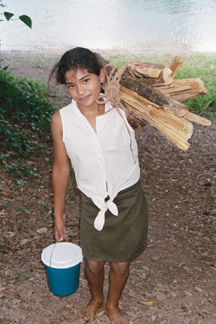 treating
complex conditions relating to stress, depression and anxiety and have
been especially useful for domestic violence victims.
treating
complex conditions relating to stress, depression and anxiety and have
been especially useful for domestic violence victims.
At Mulukuku, the combination of visiting
professionals, trained staff, and local traditions provides an opportunity
for people to learn from one another, and the patients who need medical
attention are better served. In this way, the use of complementary medicine
contributes to the wellness of individuals and the community.

Donations in July?
September? December? What to do?
We deeply respect each of you as separate individuals with your own
reasons for sharing your resources with the families in Mulukuku. Some
of you respond to each newsletter, others have told us you prefer to give
once a year. Some of you hold yard sales, others host house parties, showing
our video to friends and neighbors. Please be assured that we include a
donation envelope with each newsletter for your convenience only. You may
give as much or as little as you desire, or simply enjoy the newsletter,
knowing this wonderful work goes on in Nicaragua. Dollars go a long way
in such a poor country, so even the smallest donations are deeply appreciated.
Please enjoy the enclosed postcard as
a gift from our support group in Santa Cruz. No donation funds were expended
to print this card. If you feel so moved, you may send it along to a friend
who might be interested in learning more about Mulukuku. For more
postcards, contact Ellen Farmer by email at: wempowermentn@yahoo.com.
To view the full color photo gallery with photos by Jane Yett and Coleen
Douglas, click on the link March 2004 Photos.
Thanks again for helping us spread the
word of the tenacious Mulukuku community.
Of Note…
Special thanks and congratulations to Ben and Sloane Winkes, of Conway,
Washington, who are celebrating their wedding by asking guests to donate
to the clinic. Other couples have done this too, with a little less fanfare,
so we are hereby establishing the “wedding and anniversary donation
gift hall of fame”!
On a sadder note, Ama Szal lost her mother, Kate Szal this past June,
and, at Ama’s request, many loved ones donated to the clinic in Kate’s
name. The families in Mulukuku certainly understand loss and deeply appreciate
this thoughtful way of honoring someone’s life. |


Planning for the Future Financial Health of the Women’s Clinic
“Planned Giving,” a powerful way to support
the future of the clinic, is the process of planning a gift benefiting
you, your family, and the causes you support, now and beyond your lifetime.
Here are some ways we can help sustain the clinic into the future:
You have many options for giving, the
most popular being through a will, or a living trust to care for your needs
and those of others. Many people set aside a certain dollar amount to give
through a will. Others leave a percentage of their estate or assets remaining
after their family needs are met. Some donate possessions, such as a car,
a home, or a financial investment. For others, a living trust meets needs
now and provides gifts later.
A variety of arrangements are available
to meet specific situations. If you want to explore any of these options,
we have an excellent resource (available by phone to anyone in the U.S.)
offering free, confidential consultations to explore the most effective
way to make your gift. Their informative website also explains your options.
A call to the Planned Giving Center is for your benefit only. It does not
carry any obligations, and no one else, including us, needs to know about
your call unless you choose to tell us.
You may also wish to consult your own attorney or financial advisor.
Please feel free to contact the good folks at:
The Planned Giving Center
The Community Foundation of Santa Cruz County
Phone: 831-476-GIFT • Website: www.cfscc.org
Stock donations can save taxes and save lives. If you are planning to donate
to the clinic, and if you own appreciated stock, it may be advantageous
to donate stock instead of cash. Your donation is potentially deductible
at the appreciated level, but the appreciation is not taxed, giving you
a double tax advantage.
WEN has an account with Morgan Stanley Stock Brokerage Company, and
we have an easy electronic transfer system in place. If you want to learn
more about this or, if you want to donate stock, please contact us at:
Women’s Empowerment Network
Or you may contact our broker,
Trevor Schwartz, Financial Advisor
Associate Vice President, Morgan Stanley
800-726-3232
Trevor.Schwartz@morganstanley.com
As always, of course, you may donate via our secure Paypal system by
clicking on the button below:
Women's Empowerment Network is a non-profit 501(c)(3) organization.
Donations are tax deductible to the full extent allowed by law. Our taxpayer
ID number is: 77-0566997.
Thank you for considering these extra steps toward helping the
people of Mulukukú.


